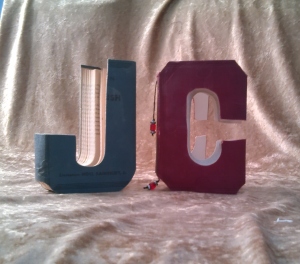I burned a book once.
True confessions: it was an ARC I got at a library or booksellers convention, and I didn’t like it. Usually I don’t burn books I don’t like—that conjures up all kinds of Nazified images, like in Indiana Jones and the Last Crusade. But it was winter, and we had a fire in the wood stove, and I was so irritated with the contents (don’t even remember what the book was now) that I bent its innocent spine and tossed a section at a time into the flames! I’m not bragging, because I still feel a little guilty. What is it about books that seem so not-for-burning?
Maybe it’s their humanity. Humans are sometimes described as embodied souls–not quite accurately, I think–but if that’s so, books are embodied minds. Every human artefact is in some way an embodiment of the mind, and we do burn old houses and letters and discontinued uniforms and items no longer useful (otherwise known as trash). Books are more personal, though: they don’t just say something about the writer, they also testify to the reader. When displayed proudly on a shelf they declare our admiration–or pretention, if we haven’t actually read them. When stuck in a briefcase or hidden under a sweater they assert our guilty pleasure. When blazing in a bonfire they express our contempt.
Some thoughts, stories, premises, and exploitations are contemptible, and I wouldn’t have a big problem with a bonfire made of Hustler magazines. When the Ephesian converts brought their occult books and magic scrolls “and burned them in the sight of all” (Acts 19:19), they meant to demonstrate the worthlessness of superstition against the power of the Holy Spirit. Book-burning is a statement—or least it seems like it should be. Remember the scene in The Day After Tomorrow where the survivors of an apocalypse are burning books in the library just to keep warm? That was a statement in itself: Look how and how quickly a civilization can fall. (I couldn’t find a video clip on youtube, but that scene has its own piece of soundtrack, appropriately mournful.)
Each volume, whether it’s Karl Marx or J. K. Rowling or Pope Benedict or Louis L’Amour or E. L. James stamped on the spine, represents some little facet of humanity, whether noble or trashy. All together, they represent one huge facet of humanity, perhaps the most definitive one: the ability to communicate in words, across continents and down the years. Even if it was written to formula by a nameless hack in a basement apartment, each book is a little voice crying out—articulately.
Voices from the flames give me the creeps.
I tend to hold on to books the way hoarders hold on to old tools, old clothes, pieces of string: I might need those particular words someday. But limited space demands culling every now and then, especially since I now get unsolicited copies for possible review. So . . . what to do with unwanted books? Not just the unsolicited ones, but the ones you now realize you’ll never get around to reading, the ones you’ve outgrown, the ones that were gifts from Aunt Marge who totally doesn’t get you?
- That’s what library sales are for, and once I’ve dropped off the two-three boxes I accumulate every year I try not to think about what happens to the books that don’t sell. Not my problem.
- Some trendy couples use books as decorating items. If you google “Creative Uses for Old Books,” or similar key words, you’ll get pages and pages of ideas: knickknack shelves, furniture, desk accessories, clocks, paper roses. A few years ago a very creative lady I know make these as giveaways for all the authors attending the Warrensburg Children’s Literature Festival:
(Those little voices may have cried out when the saber saw cut into them, but I don’t care–I’m keeping mine forever!)
- And did you know there’s a whole creative field of book sculpture? I love these—a striking blend of thought and deed, word and form, spirit and flesh. The artist said, “Let there be . . .” and it was so.
My admiration for books-as-art doesn’t change the fact that most of us can’t do this for all their unwanted titles. It’s an understated secret that publishers submit their unsold copies to the pulping machine. I shiver at the thought—some of MY books have met that fate–but at least those unappreciated pages can be reincarnated to new pages. And life goes on . . .
Tags: book burning, book sales, book sculpture, culling libraries, how to recycle old books, library sales, re-purposing books, reading


June 10, 2015 at 8:58 am |
I used some old books of my dad to make a higher place to put my bedside reading lamp. Just used glue gun to hold them together. Could still take apart if I ever want to read — which I doubt will ever happen.